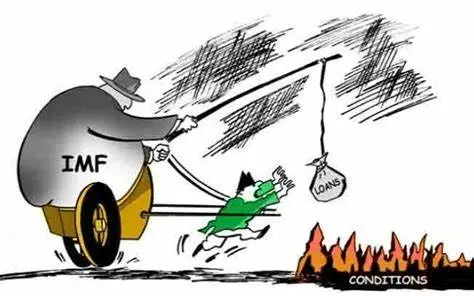Kenya's Economic Nightmare: How the IMF Enslaved Our Nation
Kenya's economy is in crisis, and it's not by accident. Explore how IMF loans are pushing the nation into a debt trap that threatens its sovereignty and future.

Let me be crystal clear from the outset: Kenya is in dire straits. Not just struggling, not just facing challenges – we are caught in an economic death spiral that threatens to destroy everything our parents and grandparents fought for. And the most infuriating part? This isn’t some natural disaster or unavoidable tragedy. No, this is a calculated, systematic plundering of our nation by global financial vultures, enabled by our own corrupt political class.
I’m tired of sugarcoating this. I’m tired of polite discussions and empty promises. The time for niceties is long past. If you’re not angry after reading this, you’re not paying attention.
Our national debt has ballooned to astronomical levels in recent years. Every single Kenyan – from newborn babies to the elderly – now owes a small fortune to our creditors. But who are these creditors? Primarily, it’s the International Monetary Fund (IMF), the World Bank, and a host of Western financial institutions that masquerade as our economic saviors while tightening the noose around our collective necks.
In just the past few years, we’ve taken on massive additional IMF loans. They sold it to us as “economic support” and “development financing.” What a crock of shit. Let’s call it what it really is: neo-colonial exploitation dressed up in a fancy suit and tie.
These loans come with strings attached – strings that are strangling the life out of our economy and our people. The IMF demands “structural adjustments” – a euphemism for gutting our public services, selling off our national assets, and prioritizing debt repayment over the basic needs of Kenyans.
Want specifics? Here’s how this plays out in real terms:
-
Healthcare Massacre: Our health budget has been slashed significantly. Hospitals are understaffed, underequipped, and overwhelmed. Maternal mortality rates have climbed sharply. Children are dying from preventable diseases because we can’t afford vaccines or basic medicines. But hey, at least we’re making our debt payments on time, right?
-
Education Gutted: Public school funding has been cut drastically over the past few years. Class sizes are ballooning, teachers are underpaid and overworked, and dropout rates are skyrocketing. We’re creating a generation of Kenyans ill-equipped to compete in the global economy, ensuring our continued dependence on foreign “expertise” and loans.
-
Cost of Living Crisis: The IMF pushed for removal of subsidies on essential goods. Result? Fuel prices have doubled in recent years. Electricity costs have soared. The price of unga, the staple food for millions of Kenyans, has multiplied. Inflation is running rampant, while wages have stagnated. People are literally choosing between feeding their children and keeping the lights on.
-
Tax Burden on the Poor: To ensure we can pay our debts, the government has implemented a slew of new taxes that disproportionately hit the poor and middle class. The Finance Act introduced a housing levy that takes a chunk out of every formal worker’s salary. VAT on fuel has increased significantly. New digital service taxes are strangling the nascent tech sector that was supposed to be our economic future.
-
Privatization Frenzy: We’re being forced to sell off state-owned enterprises at bargain-basement prices. Kenya Airways, Kenya Ports Authority, even parts of our power generation – all on the chopping block. Who benefits? Certainly not ordinary Kenyans. No, it’s multinational corporations and the politically connected elite who are snatching up our national assets for pennies on the dollar.
The human toll of this economic terrorism is staggering. Unemployment among youth has reached crisis levels. That’s not just a statistic – it represents millions of young Kenyans with no hope, no future, and growing anger. The inequality gap has become an unbridgeable chasm. A tiny fraction of the wealthiest Kenyans now control more wealth than the vast majority of the population combined. Let that sink in.
Walk through any town or village in Kenya, and you’ll see the results of this IMF-imposed austerity:
- Small businesses shuttering their doors, unable to cope with rising costs and plummeting consumer spending.
- Farmers abandoning their land because they can’t afford fertilizer or seeds.
- Young people with university degrees forced into the informal sector, hustling to survive.
- Elderly people choosing between buying medicine and buying food.
This isn’t development. This is economic warfare.
But here’s the real kicker: This debt trap isn’t an accident. It’s not poor planning or bad luck. It’s a deliberate strategy employed by global financial powers to keep countries like Kenya subservient and exploitable. We’ve traded the physical chains of colonialism for financial ones, but the end result is the same – the extraction of our wealth and resources for the benefit of others.
Let’s break down how this scam works:
-
Identify the Target: Countries with valuable resources or strategic importance (like Kenya) are identified.
-
Offer the “Help”: The IMF or World Bank swoops in with promises of development loans and economic assistance.
-
Attach the Strings: These loans come with strict conditions – privatization, deregulation, opening markets to foreign corporations.
-
Create Dependency: As the country struggles under debt and austerity, it becomes more reliant on further loans, deepening the cycle.
-
Extract the Wealth: Natural resources, public assets, and the fruits of Kenyan labor are siphoned off to repay debts and enrich foreign interests.
-
Rinse and Repeat: When the inevitable economic crisis hits, they offer more loans with even harsher conditions, and the cycle continues.
It’s a system designed to keep us poor, dependent, and pliable. And our own political class is complicit in this theft. They line their pockets with kickbacks and corrupt deals while selling out the future of our nation. The same politicians who cry crocodile tears about Kenya’s debt in public are the ones rubber-stamping these predatory loans behind closed doors.
Let’s talk about the long-term consequences of this debt trap:
-
Stunted Development: We can’t invest in crucial infrastructure or industries because every spare shilling goes to debt repayment. We’re mortgaging our future to pay for a present that isn’t even benefiting most Kenyans.
-
Brain Drain: Our brightest minds are fleeing the country in droves. Who can blame them? We’ve created an economy that offers no opportunity, no hope for advancement.
-
Environmental Destruction: In our desperation to generate foreign exchange for debt repayment, we’re exploiting our natural resources at an unsustainable rate. From deforestation to pollution of water bodies, we’re destroying the very land that sustains us.
-
Social Unrest: The combination of economic hardship, blatant inequality, and political corruption is a powder keg. We’re already having widespread civil unrest that could tear the country apart.
-
Loss of Sovereignty: Every IMF loan, every debt restructuring, erodes our ability to make decisions in our own national interest. We’re becoming a nation in name only, our economic policy dictated from Washington and London.
Now, some will argue that we need these loans, that there’s no alternative. Bullshit. There are alternatives, but they’re systematically sidelined or demonized because they threaten the current world order.
Look at how China approaches development partnerships in Africa. Are they perfect? No. But they focus on tangible infrastructure projects, offer better loan terms, and are more willing to restructure or forgive debts. Yet any move towards closer economic ties with China is met with hysterical warnings about “debt-trap diplomacy” from Western media. The hypocrisy is staggering.
We could explore south-south cooperation, building stronger economic ties with other developing nations. We could push for a new global financial architecture that doesn’t inherently disadvantage countries like Kenya. We could invest in building our own capacity for economic planning and management, reducing reliance on foreign “experts” who don’t have our interests at heart.
But perhaps most importantly, we need to challenge the very premise of this debt. A significant portion of what we owe can be classified as “odious debt” – debt incurred by corrupt regimes, for projects that didn’t benefit the people, or under coercive circumstances. We have every right – no, every obligation – to repudiate this illegitimate debt.
Some concrete steps we must demand:
-
Comprehensive Debt Audit: Every single loan, every financial agreement, must be scrutinized. What were the terms? Who benefited? Were proper procedures followed? Let’s separate legitimate debt from the odious and illegal.
-
Debt Repudiation: For those debts found to be odious or illegal, we should refuse payment. Yes, this will have consequences in the global financial markets. But the alternative – generations of Kenyans condemned to poverty to pay off corrupt loans – is far worse.
-
Renegotiation: For legitimate debts, we need to push for terms that allow for actual development, not just debt servicing. This includes lower interest rates, longer repayment periods, and conditions that prioritize Kenyan interests.
-
Transparency and Accountability: No more secret loans, no more opaque deals with the IMF or World Bank. Every financial agreement should be open to public scrutiny and debate.
-
Investment in Self-Reliance: We must redirect resources towards building our own economic capacity. This means investing in education, supporting local industries, and developing our own financial institutions that serve Kenyan interests.
-
Regional Cooperation: We need to strengthen economic ties with our East African neighbors. A united front of developing nations has far more bargaining power than each country negotiating alone.
-
Legal Action: We should explore international legal options to challenge predatory lending practices and unfair loan terms. Other nations have successfully contested debt in international courts – we should do the same.
The path forward won’t be easy. The global financial powers and their local enablers will fight tooth and nail to maintain their stranglehold on our economy. They’ll threaten us with financial isolation, with withdrawal of aid, with economic collapse if we dare to challenge the status quo.
But you know what? Let them. Because the dirty secret is this: They need us more than we need them. Our natural resources, our strategic location, our potential as a market – these are what they’re really after. If we stand firm, if we’re willing to weather some short-term pain for long-term sovereignty, we hold more cards than they want us to realize.
I’m under no illusions. The road ahead will be difficult. There will be hardships. But ask yourself this: Are those hardships any worse than the slow, grinding poverty we’re condemning ourselves to under the current system? Are they any worse than watching our children’s futures evaporate so we can make loan payments to wealthy foreign banks?
It’s time to get angry. It’s time to channel that anger into action. Because if we don’t, the Kenya we leave to our children won’t be a nation at all. It’ll be an economic colony, a debt-slave to global financial interests, our resources and labor extracted for the benefit of others while our own people suffer.
We fought for our independence once before. Now it’s time to fight for our economic liberation. The future of Kenya – the very idea of Kenya as a sovereign nation – hangs in the balance.
The choice is ours. What’s it going to be?
